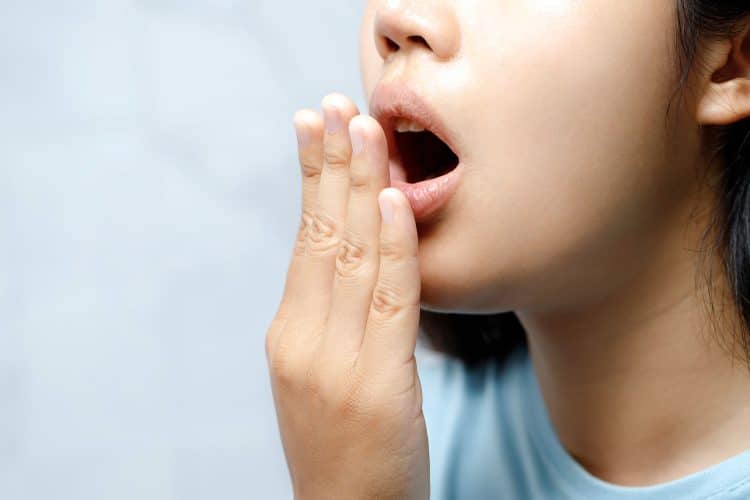Fasting has been around for ages. While some fast for religious purposes, others do it to achieve their health and wellness goals.
Some fasting practices, such as intermittent fasting, comprise a fasting window followed by an eating window. While consuming solids or sweetened beverages aren’t permitted during a fast, you can drink water and unsweetened or calorie-free fluids to keep yourself hydrated.
While chewing gum during a fast might sound odd, it can come in handy, especially if you’re struggling with hunger pangs. Here’s a closer look at what happens when you chew gum while fasting.
Will This Break Your Fast?
Find out if coffee, tea, sweeteners, and other drinks break your fast based on your specific fasting goals.
Check What Breaks My Fast →Chewing Gum Ingredients
Chewing gum is an edible substance composed of a soft gum base, sweeteners, flavors, and colors. They also have a polyol coating. Just like rubber, the texture of chewing gum is elastic, gluey, and chewy. Among the most popular types of chewing gum are buddle gum, ball gum, sugar-free gum, stick gum, and center-filled gum.
How Many Calories Does a Chewing Gum Have?
Are you wondering if your gum contains calories? Well, yes, it does. Most types of gum contain calories. A 3g stick of standard chewing gum contains around 10.8 calories, whereas a 1.8g stick of sugar-free gum from Star Wars contains about 5 calories. [1][1A]
Calories may differ depending on the gum brand so you should always read the product label before buying your chewing gum. There are several gum flavors available in the market. While some may have more than 20 calories, others, like sugar-free gum, contain less. However, chewing gum during a fast should be studied in the context of your fasting goals.
How Much Sugar Does a Chewing Gum Have?
A standard 16g pack of 10 Chiclets contains 10.6g sugar [1]. Sugar alcohols like xylitol are usually not free of calories, which can stimulate digestion and break your fast. If you are new to fasting, you may experience cravings and hunger pangs. If you want to chew gum to curb it, make sure you only choose unsweetened gum varieties and eat them in moderation.
Does Chewing Gum Break a Fast?
There has been much discussion on whether or not chewing gum can break your fast. Whether your chewing gum will break your fast will ultimately depend on the amount of sugar and calories in it. Some fasting diets allow a certain number of calories during the fasting period; if the calories in your chewing gum do not overshoot that number, it won’t break your fast.
Does Sugar-Free Chewing Gum Break a Fast?
Gum manufacturers use sweeteners instead of sugar to make sugar-free gum. It is done to make the gum taste good. Most natural sweeteners and their artificial counterparts are calorie-free. These sweeteners can provide a sweet taste without adding carbohydrates to the gum, but this makes the gum non-nutritive. Even though chewing gum can increase the volume of stomach liquids, it doesn’t affect the stomach acidity level in any challenging way.
Then will it be correct to say that gum can’t break a fast? As sugar-free sweeteners don’t contain any macronutrients, they should not cause a spike in your blood sugar levels and do not technically break a fast.
You could ensure your chewing gum is fast-safe by running through the product label. Avoid gums that contain titanium dioxide, butylated hydroxytoluene, or artificial food dyes. These ingredients are used as preservatives and coloring agents to soften the gum and give it color. Instead, you can opt for a sugar-free gum that contains monk fruit, stevia, or sugar alcohol. Sugar-free sweeteners such as xylitol, sorbitol, and maltitol are common ingredients in chewing gums, and eating multiple gums throughout the day might cause gastrointestinal discomfort.
When Can a Chewing Gum Be Safe For Intermittent Fasting?
Ideally, be it a water fast or intermittent fast, chewing gum may not be the best option, even though the sugar-free variety may contain a meager amount of calories. The sweeteners can interfere with your fasting objectives. [2]
However, a tiny piece of gum may not cause any harm as, if you stay under 50 calories, you are considered to be in the fasting state.
Sometimes people want to mimic the chewing action, and often chewing gum is the only viable option. Chewing gum can help burn up to 11 calories every hour. If chewing gum is an essential physiological factor that makes fasting easier for you, you may consider it. Nonetheless, avoid consuming it in large quantities.
Healthier Alternatives to a Chewing Gum in a Fast
You can drink unsweetened lemon water, green tea, ginger tea, cinnamon, or black coffee while intermittent fasting. These can give you an energy boost to sustain yourself through the fast. However, you should avoid excessive tea and coffee during a fast as they contain high caffeine content.
If you aren’t sure about chewing gum during a fast but wish to keep hunger and cravings at bay, here are a few alternatives to choose from:
1. Cinnamon
Cinnamon contains potassium, magnesium, calcium, and other vitamins and minerals. It can aid in stabilizing your blood glucose levels, reduce inflammation and protect against heart disease. You can have less than one teaspoon of cinnamon during your fast.
2. Apple Cider Vinegar Gummies
Apple cider vinegar gummies contain around 15 calories but offer better nutritional value than chewing gum. Restrict yourself to one sugar-free apple cider vinegar gummy during your fasting phase.
3. Ginger Tea
Ginger tea contains vitamin B6, magnesium, potassium, and copper in addition to negligible calories and carbohydrates. It has healing properties, can help fight inflammation, and relieve digestive issues. Moreover, it can strengthen your gumline and whiten your teeth. Not more than 1 tbsp is recommended during a fast.
4. Green Tea
Green tea comprises calcium, iron, and potassium and has no carbohydrates, sugar, or fat. It can naturally promote fresher breath, unlike chewing gum’s artificial flavors. You should not drink more than three to four cups of tea a day during intermittent fasting.
5. Mint Tea
Mint is a good source of potassium, calcium, folate, vitamin C, and vitamin A. It has only around two calories per 100ml, which is relatively less than sugar-free gum. Although it has no sugar and zero calories, you should avoid drinking more than 3-4 cups of mint tea daily during fasting.
6. Black Coffee
Black coffee has 2g of calories and 5mg of sodium. Limit your black coffee intake to 2-3 cups during a fast.
Benefits of Chewing Gum
Here are a few advantages of chewing gum:
1. Reduces Hunger
Chewing gum might help reduce hunger pangs and aid in burning fat. Studies reveal that chewing gum has been considered an appetite and hunger regulator, especially during fasting [3]. Chewing sugar-free gum during a fast may prevent impulsive eating by keeping you satiated and stabilizing glucagon levels. A study also indicated that chewing sugar-free gum for 30 minutes did not alter insulin levels [4].
2. Does Not Affect Insulin Levels
If you’re wondering if chewing gum affects your insulin levels, this may bring you some relief. Chewing gum does not have any effect on your insulin levels. During a fast, your insulin levels drop because your body is burning fat as energy instead of carbohydrates. If your body enters ketosis during fasting, your insulin level can drop as well.
3. Fix Bad Breath
Fasting for prolonged periods can cause dry mouth and bad breath issues. Chewing gum can bring respite from these issues. [5]
Chewing gum can keep your teeth healthy if it doesn’t contain sugar. It, for a certain period, can protect your teeth by removing debris and brushing on dental plaque. It can also increase salivary flow to your mouth and help prevent a dry mouth during fasting [6]. Your saliva carries phosphate and calcium that can strengthen the enamel of your teeth [7].
4. Relieves Heartburn
Chewing gum can reduce heartburn and acid reflux as it can reduce the acid levels in your esophagus. It can also help you handle any acidity rising from the consumption of food post-fasting. Also, mint and ginger-flavored sugarless chewing gum can soothe nausea. Just make sure to restrict to one stick. [8] [9]
5. Reduces Anxiety
Several studies show that chewing gum can reduce stress. Research reveals that salivary cortisol levels while chewing gum can elevate motivation levels and enable biological responses that can help you overcome anxiety. [10] [11]
Chewing gum can improve your alertness and fight drowsiness. Wondering how? Chewing gum increases blood flow to your brain. It stimulates the brain, which can positively impact your alertness levels. It can help you combat any brain fog from fasting. [12]
Downsides of Chewing Gum
While chewing gum has many benefits, here are some of the disadvantages:
1. Increases the Risk of Tooth Decay
Sugar gums can coat your teeth, and they may contain artificial flavors and preservatives that could gradually dissolve your enamel. Patients with mercury fillings may end up leaching neurotoxin into their bodies because of chewing gum.
2. Stomach Bloating After Chewing a Gum
As chewing signals eating to your brain, your body activates enzymes and acids to digest food. This can cause bloating and reduce your ability to digest food. Chewing gums with artificial sweeteners can also cause gastrointestinal problems.
Frequently Asked Questions
1. Is chewing gum safe other than fasting?
Yes, chewing gum is generally considered safe. Sugar-free gums do not affect your insulin or blood sugar levels.
2. Can you chew gum while water fasting?
Consuming calories will technically break your water fast. Chewing gum is not generally allowed during water or therapeutic fasting.
3. Are any situations that make chewing gum okay during intermittent fasting?
Chewing one stick of sugar-free gum free of harmful ingredients may not interfere with your intermittent fasting goals. However, it would be best to remember that gum contains calories, and every piece will add up.
4. Will extra chewing gum kick me out of ketosis?
You’ll come out of ketosis if you chew gum that consists of artificial sweeteners, preservatives, and other artificial ingredients.
5. Can I chew gum on keto intermittent fasting?
Whether you follow a keto diet or wish to keep your carbs low, it is best to find keto-friendly chewing gum brands for staying in ketosis. Sugar-free gums with negligible calories are least likely to break your fast.
6. Can you chew gum while fasting for a glucose test?
It is best to avoid chewing gum when fasting for a blood test, even if your gum does not contain sugar. Chewing gum can speed up your digestion process, impacting the test results.
7. Does chewing gum ruin intermittent fasting, and to what extent does it have the same effect a meal would have?
If it is an unsweetened gum, it is least likely to provide any significant calorie gain. However, the problem is when you eat multiple pieces of gum throughout the day. Then, sweetened or unsweetened, it can interfere with your intermittent fasting diet. Eating five pieces of regular gum daily can add around 100 calories, which is good enough to break your fast.
Learn more about fasting
- Fasting Electrolyte Calculator - Sodium, Potassium, Magnesium
- PSMF Calculator - Protein Sparing Modified Fast
- Fasting Schedule Generator - Build Your Plan
- Ketosis Calculator - When Do You Enter Ketosis?
- Metabolic Switching Calculator - Fat Burning Timeline
- 5:2 Diet Calculator - Fast Day Calories
- IF Macro Calculator - Intermittent Fasting Macros
- Live Fasting Timer - Track Your Fast in Real Time
- Fasting Progress Tracker - Track Your Journey
- Fasting Protocol Comparison - Find Your Best Method
Final Thoughts
Sugar-free chewing gums minimally impact insulin levels as they contain negligible calories, which can be burnt in your everyday activity. Hence, it is unlikely to break your fast.
If you are following a stricter fasting practice, you can abstain from ingesting any calories. Moreover, some gum variants are high in sugar, and chewing them throughout the day can lead to additional calorie intake.
References
Fitness Volt is committed to providing our readers with science-based information. We use only credible and peer-reviewed sources to support the information we share in our articles.
- “FoodData Central.” FoodData Central, fdc.nal.usda.gov/fdc-app.html#/food-details/168771/nutrients. Accessed 29 Oct. 2022. “FoodData Central.” FoodData Central, fdc.nal.usda.gov/fdc-app.html#/food-details/528909/nutrients. Accessed 31 Oct. 2022.
- 12. Tandel, Kirtida R. “Sugar Substitutes: Health Controversy over Perceived Benefits – PMC.” PubMed Central (PMC). Accessed October 29, 2022.
- “Short-term Effects of Chewing Gum on Satiety and Afternoon Snack Intake in Healthy Weight and Obese Women – PubMed.” PubMed, 15 May 2016, pubmed.ncbi.nlm.nih.gov/26948161.
- 11. Toledo, Françoise Wilhelmi de, Franziska Grundler, Audrey Bergouignan, Stefan Drinda, and Andreas Michalsen. “Safety, Health Improvement, and Well-Being during a 4 to 21-Day Fasting Period in an Observational Study Including 1422 Subjects – PMC.” PubMed Central (PMC), January 2, 2019.
- Xu, Jianping. “The Effect of Gum Chewing on Blood GLP-1 Concentration in Fasted, Healthy, Non-Obese Men – PMC.” PubMed Central (PMC), March 11, 2015.
- Fiyaz, Mohamed, Amitha Ramesh, Karthikeyan Ramalingam, Biju Thomas, Sucheta Shetty, and Prashanth Prakash. “Association of Salivary Calcium, Phosphate, pH and Flow Rate on Oral Health: A Study on 90 Subjects – PMC.” PubMed Central (PMC). Accessed October 29, 2022.
- “The Effect of Chewing Sugar-Free Gum on Gastro-Esophageal Reflux – PubMed,” November 1, 2005.
- “The Effect of Fasting on 24-Hour Intragastric Acidity and Plasma Gastrin Concentration – PubMed,” February 1, 1991.
- Smith, Andrew P. “Chewing Gum and Stress Reduction – PMC.” PubMed Central (PMC), April 24, 2016.
- Hasegawa, Yoko, Yoshihisa Tachibana, Takahiro Ono, and Hiromitsu Kishimoto. “Flavour-Enhanced Cortisol Release during Gum Chewing – PMC.” PubMed Central (PMC), April 5, 2017.
- “Effects of Chewing Gum on Mood, Learning, Memory, and Performance of an Intelligence Test – PubMed,” April 1, 2009.
- Kakodkar, Pradnya, and Soniya Mulay. “Effect of Sugar-Free Gum in Addition to Tooth Brushing on Dental Plaque and Interdental Debris – PMC.” PubMed Central (PMC). Accessed October 29, 2022.
Tip: If you're signed in to Google, tap Follow.














